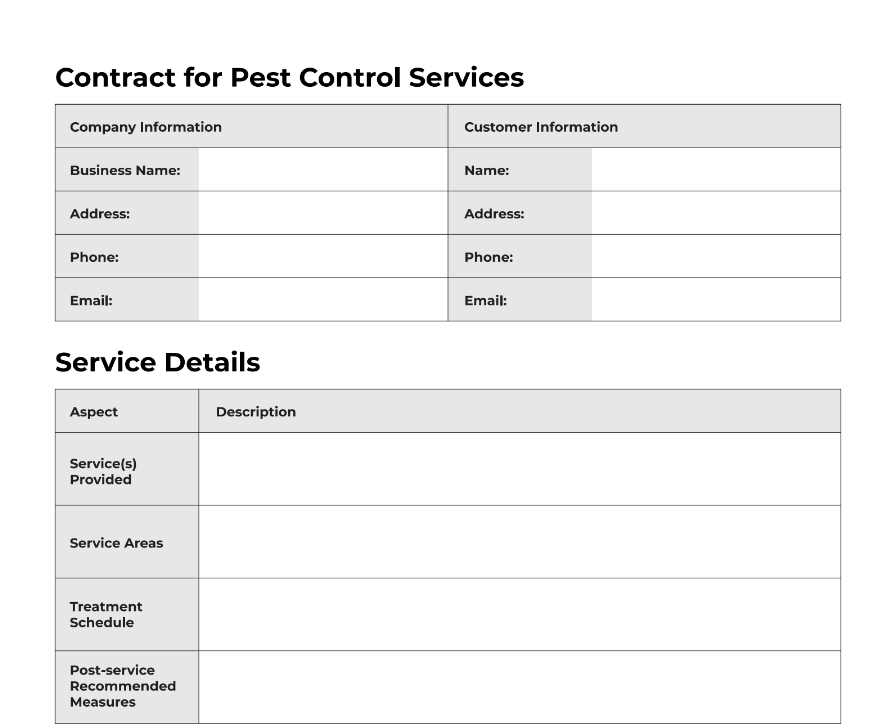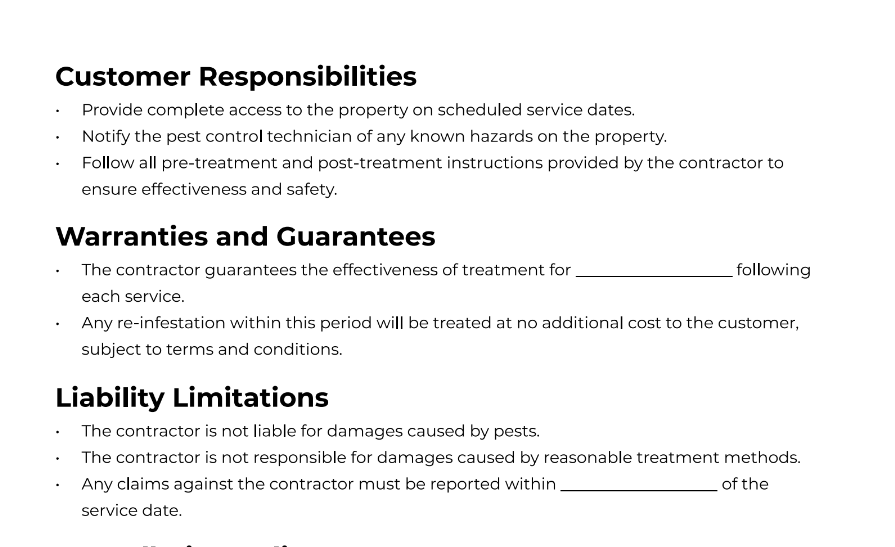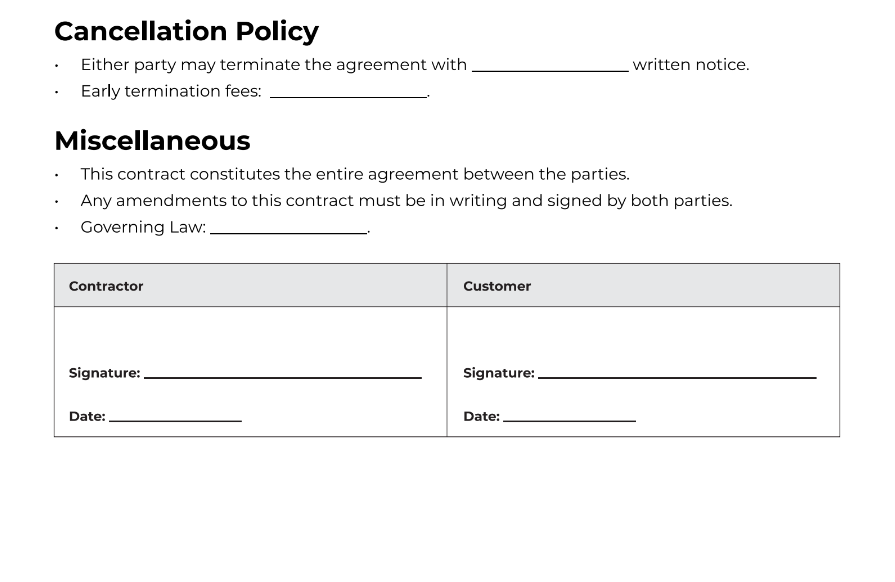Pest Control Contract Template (+Free PDF Download)
Residential and commercial pest control companies of all sizes enter into service agreements with their customers. These agreements help protect both parties — guaranteeing the quality of the work and outlining what the services do and do not include and at what cost.
As a busy pest control operator, you may be unsure of contract form essentials and how best to protect your business investments while maintaining positive client relationships.
This article guides you through creating a comprehensive and legally binding pest control contract. Read below, then download our fillable pest control contract template PDF to get started.

How Do I Write a Pest Control Contract?
A pest control contract should be personalized to each customer and job. While the terms will vary according to the pest issue and service type, generally, a pest control agreement should include the following sections.
1. Identify parties and contact information
Contracts must clearly identify the service provider (pest control company name) and the client (property owner or manager). Include full legal names, addresses, zip codes, phone numbers, and email addresses for each party listed. Include both the customer’s home address and the service location if different.
Accurately identifying the parties provides some legal protection, while including contact information and supports communication throughout the contract.
2. Outline the scope of services
To avoid confusion, the contract must clearly state what services the pest management scope of work does and does not include. For example, will pest control treatments be interior-only or interior and exterior?
Establishing a clear scope allows the client to hold the pest control company accountable for delivering the services satisfactorily. It also helps avoid scope creep by providing a record of agreed-upon services.
3. Define the duration of the contract and service schedule
Next, define the contract duration, whether a one-time application, seasonal contract, or year-round pest control service agreement. If the contract is for recurring services, outline a service schedule, including the total number of visits included and cadence.
This contract section clearly states the start date and end date of the contract, if applicable. Use a calendar format or table to illustrate the service schedule, indicating dates or intervals for each visit. Consider including provisions for rescheduling visits in case of unforeseen circumstances.

4. Clearly state the total cost of the services and payment terms
Establishing payment terms ensures both parties understand when payments are due and how they are expected to be made. Detail the total cost of the services to be provided and a breakdown of the fees.
Include a payment schedule and accepted payment methods, such as check or credit card. If applicable, list late payment penalties or interest charges for overdue payments.
5. Include warranties or guarantees
Provide customers with peace of mind by listing out any warranties or guarantees your business offers on services provided. In clear language, describe what your guarantee covers and any exclusions. Be sure to include the duration of your warranty or guarantee and instructions for how a customer should initiate a warranty claim.
6. Clarify the insurance coverage
Customers want to know that your business carries insurance, protecting them against any property damage and ensuring they won’t be liable for workplace injuries. An insurance section adds value to the contract by demonstrating your commitment to customer protection and professional conduct.
List the company's insurance types, such as general liability insurance, property damage insurance, and workers’ compensation insurance. You may even list the insurance companies, coverage amounts, and policy numbers. Provide contact information for the insurance provider for inquiries or verification.
This section is also a good place to list any specific pest control certifications or licenses, such as a commercial pesticide applicator certificate.
7. Include general terms and conditions
Lastly, the pest control contract terms and conditions must be listed. This section outlines the rules and regulations that govern the contractual relationship between the pest control provider and the client.
Address key areas such as contract duration, cancellation clauses, confidentiality, indemnification, and compliance with local regulations. Consider consulting a legal professional when drafting terms and conditions to ensure they adequately protect all parties involved and comply with applicable laws and regulations.

Why Do Pest Control Companies Use Contracts?
A pest control services contract sets the stage for clear communication and accountability between contractors and customers. Contracts establish procedures for dispute resolution, minimizing conflicts and promoting fair resolutions. When needed, they provide legal protection to all parties.
A contract conveys professionalism while reducing confusion by clearly defining service expectations, pricing, and schedules. As a result, a comprehensive pest control service agreement form often saves CSRs valuable time that may otherwise be spent answering customer questions about payment terms, guarantees, or other service specifics.
Ultimately, contracts serve as foundational documents that protect the interests of the parties and promote trust and confidence in the business-client relationship within the pest control industry.
Downsides to Using a Contract Template
While a pest control service contract template provides a good starting point, using one remains largely manual, as it has to be customized for each job. Many pest control providers ditch Google Docs to automate the process and turn to business management software.
Such platforms offer customizable pest control service agreement templates, ensuring that all essential work order clauses and provisions are included and tailored to meet industry standards and legal requirements. Moreover, these solutions often provide built-in features for easy customization, document management, and compliance tracking, streamlining contract management processes and reducing administrative burdens.
For example, FieldRoutes allows users to create and track pest control proposals and forms from the FieldRoutes Mobile app and then capture digital signatures. Once created, a digital copy can e viewed in the office or the field. This expedites service response, making technicians more productive and freeing time to focus on excellent customer service.
Streamline Your Operations With Pest Control Business Software
To protect your business investments, you must utilize a pest control contract. A printable sample pest control contract template prevents business owners from creating contracts from scratch each time.
To streamline your operations, from contract management to scheduling and reporting, leverage FieldRoutes, an end-to-end business management software solution tailored to the pest control industry. FieldRoutes enables pest control companies to eliminate manual processes, make data-driven decisions, and grow their profits.
Get started today with a free demo of the FieldRoutes Operations Suite.